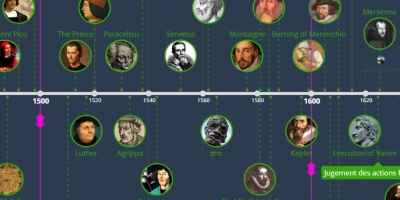jan 1, 1160 - Renaissance
Description:
In the "renaissance of the 12th century", Europe was to the Muslim world as 1776-America to Europe ("fresh, young, and naive"; The Rise of Early Modern Science)
Algebra in Latin / Robert of Chester - 1145
Arabic numeral system / Adelard of Bath
Almagest / Gerard of Cremona in Toledo - 1175
Aristotle / Gerard of Cremona and...
============================
Clockwork Universy; Prim-Second Qualities
While in Islam a dominant idea is the occasionalism of the mutakallimūn, the Latin scholars start promoting naturalism.
Plato's Thimeus is an important influence, Aristotle is not yet (well?) known.
"Peter Abelard (d. 1142), sought to explicate the separation between the autonomous forces of nature and those of the divine and preferred naturalistic explanations whenever they could be worked out [...] Furthermore, this image of the world as an ordered place gave rise to the idea of the world as a machine, as witnessed in the writings of Hugh of St. Victor: "As there are two works, the work of creation and the work of restoration, so there are two worlds, visible and invisible [***metaphysics, secondary and primary qualities***]. The visible world is this machine, this universe, that we see with our bodily eyes. " This idea of a universal machine is likewise the title of one of Robert Grosseteste's scientific treatises and is an image witnessed repeatedly in the writings of the age." [Rise of Early Modern Science]
============================
Scripture and Science:
"William of Conches (d. 1154) put it even more boldly when he affirmed that "it is not the task of the Bible to teach us the nature of things; this belongs to philosophy." How strongly parallel this seems to Galileo's statement in the seventeenth century that "the intention of the Holy Ghost is to teach us how one goes to heaven, not how heaven goes." [Rise of Early Modern Science]
"William of Conches takes it further by asserting the priority of physical reasoning: "And the divine page says, 'He divided the waters which were under the firmament from the waters which were above the firmament.' Since such a statement as this is contrary to reason let us show how it cannot be thus."
============================
Naturalism in Hexameral literature
William of Conches's Dragmaticon philosophiae (A Dialogue on Natural Philosophy) is at first not recognizable as Hexameral literature—almost no biblical quotations, no explicit exegesis, but the dialogue extends over six days, and each day’s topics correspond to the topics associated with each day of creation in Genesis. [like Descartes?]
1. William was also deeply influenced by Plato’s Timaeus.
2. God created a “chaos,” a mixture of the elements at the beginning; then, they begin to move according to their natural properties.
3. He also deals with the issue of “waters” above the heavens, leading the Duke to exclaim that William ignores God’s power. William retorts that God’s omnipotence is not an adequate explanation of natural things.
4. William uses logical analysis based on the observable properties of natural bodies and notes that it is often necessary to disagree with the opinions of the Church Fathers in matters of natural philosophy.
****
5. For William, life on earth arose from the natural action of heat on mud. Even man originated thus, even though God gave him a rational and immortal soul.
6. In fact, “several species” of humans could be generated naturally this way, and indeed, they still could be today. The fact that this did not happen is presumably God’s unwillingness for it to occur.
*****
==============================
it may be suggested that the twelfth-century renaissance in Europe laid the foundations for a scientific research program, and it contained, according to Tina Stiefel, the following assumptions: • That a rational and objective investigation of nature in order to understand its operation is possible and desirable. • That such an investigation might make use of techniques of mathematics and deductive reasoning. • That it should use empirical methodology - i.e., evidence based on sensedata, where possible. • That the seeker for knowledge of nature's operations (a "scientist") should proceed methodically and with circumspection. • That the scientist should eschew all voices of authority, tradition and popular opinion in questions of how nature functions, except to the extent that the information is rationally verifiable. • That a scientist must practise systematic doubt and sometimes endure a state of prolonged uncertainty in his disciplined search for an understanding of natural phenomena.
Added to timeline:

Frühneuzeit
Date:
Images:
![]()
